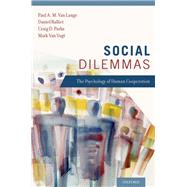One of the key scientific challenges is the puzzle of human cooperation. Why do people cooperate? Why do people help strangers, even sometimes at a major cost to themselves? Why do people want to punish people who violate norms and undermine collective interests?
This book is inspired by the fact that social dilemmas, defined in terms of conflicts between (often short-term) self-interest and (often longer-term) collective interest, are omnipresent. The book centers on two major themes. The first theme centers on the theoretical understanding of human cooperation: are people indeed other-regarding? The second theme is more practical, and perhaps normative: how can cooperation be promoted? This question is at the heart of the functioning of relationships, organizations, as well as the society as a whole. In capturing the breadth and relevance of social dilemmas and psychology of human cooperation, this book is structured in three parts. The first part focuses on the definition of social dilemmas, along with the historical development of scientific theorizing of human cooperation and the development of social dilemma as a game in which to study cooperation. The second part presents three chapters, each of which adopts a relatively unique perspective on human cooperation: an evolutionary perspective, a psychological perspective, and a cultural perspective. The third part focuses on applications of social dilemmas in domains as broad and important as management and organizations, environmental issues, politics, national security, and health.
Social Dilemmas is strongly inspired by the notion that science is never finished. Each chapter therefore concludes with a discussion of two (or more) basic issues that are often inherently intriguing, and often need more research and theory. The concluding chapter outlines avenues for future directions.








